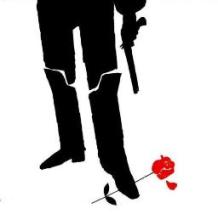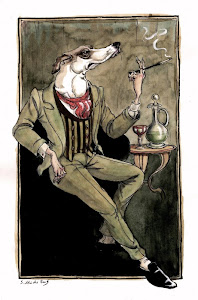 Courage, personal honor, and spiritual and physical self-surpassment are often cited as the most important virtues of paganism. In contrast to Christian and Marxian utopian optimism, paganism emphasizes the profound sense of the tragic, the tragic--as seen in Greek tragedies--that sustains man in his Promethean plight and that makes his life worth living. It is the pagan sense of the tragic that can explain man's destiny---destiny, which for old Indo-Europeans "triggered action, endeavor, and self-surpassment. Hans Günther summarizes this point in the following words:
Courage, personal honor, and spiritual and physical self-surpassment are often cited as the most important virtues of paganism. In contrast to Christian and Marxian utopian optimism, paganism emphasizes the profound sense of the tragic, the tragic--as seen in Greek tragedies--that sustains man in his Promethean plight and that makes his life worth living. It is the pagan sense of the tragic that can explain man's destiny---destiny, which for old Indo-Europeans "triggered action, endeavor, and self-surpassment. Hans Günther summarizes this point in the following words: Indo-European religiosity is not rooted in any kind of fear, neither in fear of deity nor in fear of death. The words of the Latter-day Roman poet, that fear first created the Gods (Statius, Thebais, 3:661: primus in orbe fecit deos timor), cannot be applied to the true forms of Indo-European religiosity, for wherever it has unfolded freely, the "fear of the Lord" (Proverbs, Solomon 9, 10; Psalm 11, 30) has proved neither the beginning of belief nor of wisdom.
Some have suggested that the greatest civilizations are those that have shown a strong sense of the tragic and that have had no fear of death. In the pagan concept of the tragic, man is encouraged to take responsibility before history because man is the only one who gives history a meaning. Commenting on Nietzsche, Giorgio Locchi writes that, in pagan cosmogony, man alone is considered a forger of his own destiny (faber suae fortunea), exempt from biblical or historical determinism, "divine grace," or economic and material constraints. Paganism stresses a heroic attitude toward life as opposed to the Christian attitude of culpability and fear toward life. Sigrid Hunke writes of the essentialization of life, since both life and death have the same essence and are always contained in both. The life, which at any moment is face-to-death and with-death, renders the future permanent in each instant, and life becomes eternal by acquiring an inscrutable profundity, and by assuming the value of eternity.
Tomislav Sunic, 'Marx, Moses, and the Pagans in the Secular City', CLIO: A Journal of Literature, History, and the Philosophy of History, vol. 24 No 2, Winter 1995





















6 comments:
Dr. Sunic makes a good case for paganism. Christianity, unfortunately, is susceptible to egalitarian and universalist values (if not congenitally so).
Whether or not a pagan revival could take place - who knows? I have my doubts about the resurgence of sincere Thor worship (as opposed to thinking the concept of Thor really great), but stranger things have happened.
Dr. Sunic is quite the badass cultural commentator, rather along the lines of Alain de Benoist and his cadre of "literary fascists." His views and analysis are quite profound and extend far beyond any philosophy usually implicit in mere religiosity.
He appears weekly on The Voice of Reason Broadcast Network. Archives of his show can be found at their site:
http://reasonradionetwork.com/programs/the-sunic-journal
I beg to disagree with this author, Dr Sunic book is not accurate enough when it comes to the history of paganism, and I do disagree that Christianity is for egalitarian and universality values. While this is not the place to get into debates about Christianity, I would like to say that The Catholic Church has been the only institution defending western monarchies against the red thugs and anarchists like the socialists (a reading of the history of the fall of modern aristocracies should be enough to make my point). Sadly enough, the institution itself has been full of equality-minded bigots, feminism-minded clerics who did everything to ensure the nefarious mess the Church finds itself in now. Historical accuracy, with a precise and delicate judgement of history is a golden standard which historians from the eighteenth century till today have failed to ensure.
“Christian attitude of culpability and fear toward life”, this is something which is not true and is a great caricature. Courage, personal identity and so on are themselves virtues which are inherent to natural law, this is why most civilisations, and even African pagans kept these virtues firmly, something which has sadly enough disappeared in the West.
I enjoy the blog ol' fella!
S.
I think Charles Maurras is the best writer about paganism I have ever read, he avoided the mistakes some of his predecessors and modern writers make when they write about nationalism, paganism and identity, and he is certainly far more sharper when it comes to historical, philosophical, anthropological arguments, which he used to defend a (sane)paganism and cultural identity. It is too bad he was seen as a Nazi, while his fascism was one of national identity, not one of arrogant superiority; and this distinction is very important, since most of the fascists of then and now have fallen into moral depravity, which is a civilisation destroyer. Charles Maurras makes it clear why one can be proud about his nation, but not arrogantly vainglorious about it.
Looks like I'm buying another book. This is getting expensive.
Post a Comment